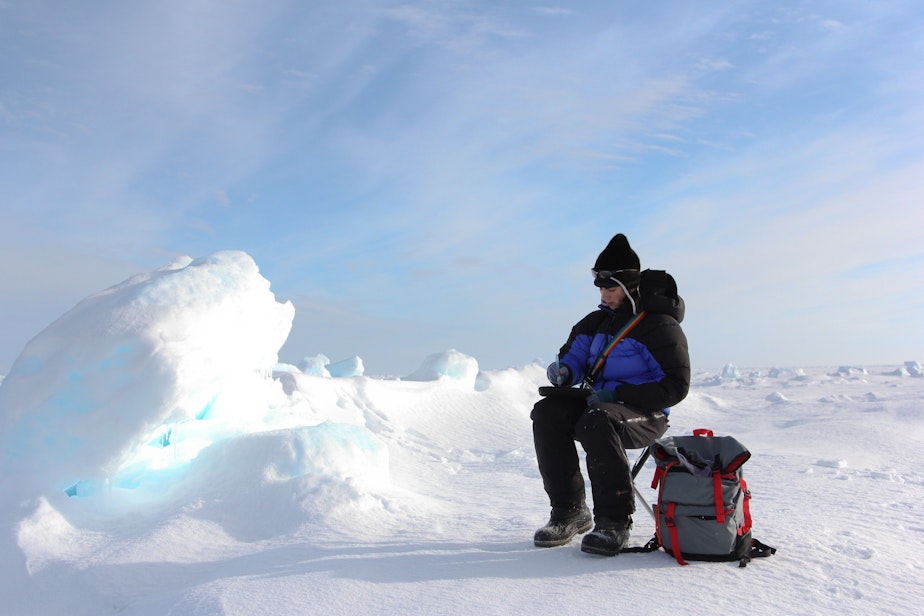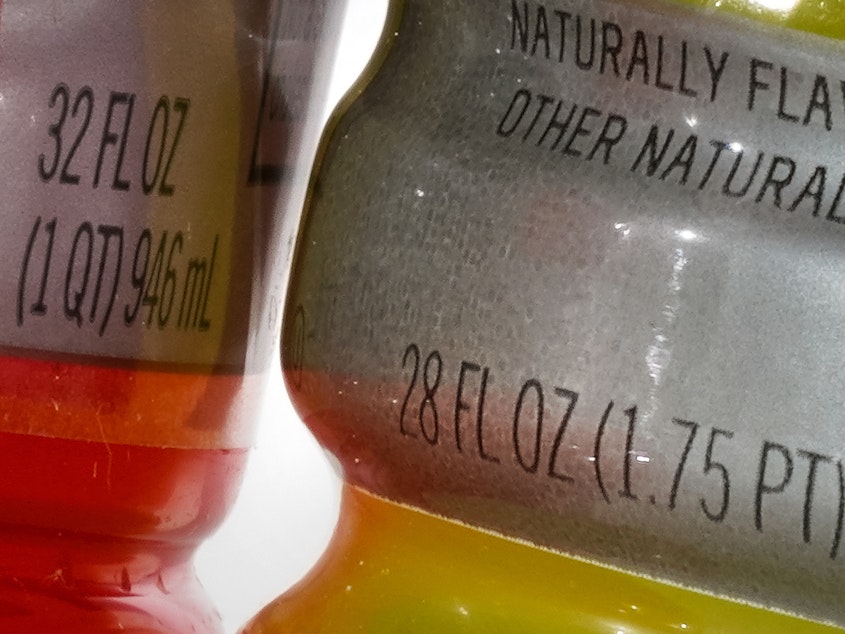The art of glacial decline: Today So Far

- These artists take a hike to put environmental science into their work.
- Climate change is taking a toll on this Puget Sound park.
- Blockchain tech just paid for carbon credits to conserve three considerable chunks of forested land in Western Washington ... I still don't know what a blockchain is.
This post originally appeared in KUOW's Today So Far newsletter for June 9, 2022.
If Bob Ross were painting around Washington today, I imagine it would go something like this:
"And here, let's add a little stream coming down the mountain ... it's a sad stream because it misses its friends, the glaciers that used to be high up in the mountains. We're gonna need a lot of liquid white for this, which is good since we didn't use much of it for the glaciers ... because they've disappeared ... oh, and by the way, I want to introduce you to my squirrel friend..."
Bob Ross isn't painting these days, may he rest in peace. But there are a handful of hiking artists who are trekking up the Olympics and Cascades with researchers to document the decline of the region's mountain glaciers. They also create paintings related to salmon, landscape loss, and reforestation.
"That means sharing information or stories about science in ways that are more accessible, or maybe they can just reach different audiences than the more traditional ways of sharing science," Jill Pelto told KUOW's Soundside, adding that she incorporates actual data into her paintings.
"I'm trying to use that actual information of that data to help tell a more literal, visual story of why this graph and this simple line matters," Pelto said.
Sponsored
Pelto is one of three artists who spoke with Soundside. Read the full story, and see some art, here.
Climate change is also taking a toll down the mountain, at the parks many of us lowlanders enjoy.
Take Tacoma's Point Defiance Park. Officials recently had to block off access to cars on the popular Five Mile Drive. The erosion on the nearby cliff has become so severe that it has inched too close to the road. Cliffsides erode all around Puget Sound, but park officials note that factor has been exacerbated by rising water and increased wave activity bashing against the walls.
The official report on the park's erosion did not make a connection to climate change. Still, officials are pointing to this five-mile stretch as an example of changing conditions. Check out Soundside to hear why.
If you're like me and have a hard time understanding how blockchain technology works, that's OK. This next story is more about trees.
Regen Registry is one such blockchain company, based in Delaware. According to a spokesperson, the company is "a proof-of-stake blockchain, where users confirm data and ensure security through a process of collateral staking with validators." And if that doesn't clarify it, then perhaps it will help to hear that it is "a blockchain-native decentralized platform for the origination, listing and exchange of high-quality ecological assets."
...perhaps I should just get to the part about the trees.
Even if we don't entirely understand blockchain, there's a lot of money in the tech. Regen Registry just invested $1 million in carbon credits to help preserve three considerable chunks of forested land in Western Washington — 33 acres in the city of Issaquah, 12 acres on the north side of Sammamish's Soaring Eagle Regional Park, and 2.6 acres in Shoreline that are part of the Mountains to Sound Greenway.
This land was slated for commercial timber, which would have cut down the trees. The carbon credits preserve the land, and keep those trees taking in carbon, and pumping out oxygen. That's sort of the selling point for this region.
As Soundside reports, carbon credits have come under criticism for how some companies use them. Basically, a company could purchase a carbon credit here and pump out more carbon over there. But that's not what's happening in this case.
Sponsored
AS SEEN ON KUOW

A King County Superior Court judge has allowed the public release of photos showing the various tattoos covering Auburn police officer Jeffrey Nelson, who is awaiting trial for murder. Nelson displays tattoos on his hands: “JUDGED BY XII” on the right hand; “CARRIED BY VIII” on the left. That’s shorthand for an old policing proverb: “I’d rather be judged by 12” jurors than “carried by six” — or sometimes eight — pallbearers. (King County Prosecutor's Office)
DID YOU KNOW?
Feel proud when you tip your server, delivery driver, or other worker. It used to be illegal in Washington state. Freedom!
On June 8, 1909, a statewide law went into effect that banned tipping. It made giving and receiving any tip a misdemeanor offense. It didn't last long, however, and was repealed in 1913. I suppose it was difficult to have a cop watch each and every transaction to make sure no one was overpaying for service.
According to History Link, the anti-tipping effort was the result of a nationwide Progressive/labor movement of the time. The Seattle Post-Intelligencer wrote an editorial in favor of the move, saying "the acceptance of a tip is indefensible on moral grounds." The paper further argued that "it is beggarly for a man to accept" a tip, and that if a waiter could not make a living on a straight-up wage, then they should find another job where they could.
ALSO ON OUR MINDS

It's the inflation you're not supposed to see. From toilet paper to yogurt and coffee to corn chips, manufacturers are quietly shrinking package sizes without lowering prices. It's dubbed "shrinkflation," and it's accelerating worldwide.

